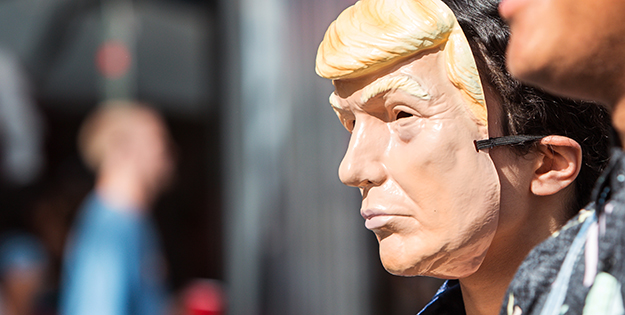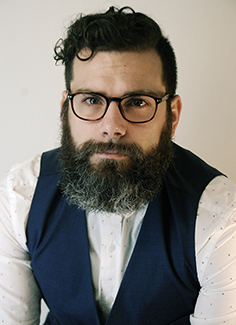Global
Copyright@ Australian Catholic University 1998-2026 | ABN 15 050 192 660 CRICOS registered provider: 00004G | PRV12008
Copyright@ Australian Catholic University 1998-2026 | ABN 15 050 192 660 CRICOS registered provider: 00004G | PRV12008

There’s a movie on Netflix called Ingrid Goes West — it's a cautionary tale about Instagram-fuelled narcissism, where the lead character concocts a picture-perfect persona for the sake of online attention and validation.
Ingrid isn’t concerned with the truth. Her goal is simply to big-note herself. She is, in short, a bullsh*tter.
You probably know someone just like her; people who play fast and loose with the truth whenever an opportunity arises to talk themselves up.
Indeed, there’s more than one bullsh*tter in Ingrid Goes West. Towards the end of the film, when Ingrid’s penchant for BS is revealed to her acquaintances, she confronts Taylor, the Instagram influencer she spends most of her time trying to impress, and accuses her of doing the same thing.
“You pretend to be some cool LA chick but you’re so full of sh*t!” Ingrid yells. “You are just like me …”
And it’s true. Like Ingrid, Taylor doesn’t mind bending the truth if it serves her purpose. She tells people she’s “obsessed” with The Deer Park by Norman Mailer — a book she’s never read — presumably to make her seem more intelligent.
You might say that’s harmless, a white lie. But in the post-truth age, one that’s characterised by fake news, conspiracy theories and Instagram posers like Ingrid and Taylor, modern society seems to be drowning in BS.
Despite this, relatively few large-scale empirical studies have been conducted into the issue.
Which is why a trio of researchers, including ACU’s Professor Philip Parker, sought to add to the literature with their groundbreaking study, Bullsh*tters. Who are they and what do we know about their lives?
The professor and his colleagues John Jerrim and Nikki Shure analysed the OECD’s PISA data, which assesses how well 15-year-olds have mastered key academic subjects.
Among the many genuine questions asking students their level of familiarity with key mathematical concepts are three fakes, inviting them to state their level of expertise in concepts that do not exist.

The answers, from some 40,000 teenagers in nine English-speaking countries, provide an interesting insight into who bullsh*ts.
“What we found, probably unsurprisingly, was that the United States and Canada topped the list on the bullsh*t scale,” says Professor Parker, a program leader at ACU’s Institute for Positive Psychology and Education.
They also found that teenage boys were more likely to bullsh*t than girls, and richer kids were more likely to bullsh*t than poorer kids.
“That would suggest that BS is the purview of the privileged,” Parker adds, “which raises the question: is this a skill that modern society values and reinforces? Do we put stock in somebody's ability to bullsh*t?”
The Bullsh*tters study had another interesting finding: those who engage in BS are more likely to think they’re smarter than they actually are.
Says study co-author Nikki Shure: “Bullsh*tters express much higher levels of self-confidence in their skills than non-bullsh*tters, even when they are of equal academic ability.”
But not only are they overconfident; bullsh*tters are also more likely to believe they are popular at school. Cool kids, we’re looking at you.
The idea that confidence and bullsh*t are linked is perhaps not surprising, says Parker, given that society tends to value self-belief over fear and self-doubt.
“You can see how it happens, because confidence is generally seen as a good thing, and when companies talk about ‘21st Century skills’, they stress the importance of confidence,” he says. “But the line between confidence and BS can be quite easily crossed."
Parker isn’t claiming that bullsh*t is a 21st century phenomenon. It’s clearly not a new thing. What is new is the rise of social media-based discussion, which often values sensationalism over reasoned discourse, meaning that BS tends to fly at us thicker and faster than in the past.
“Bullsh*t has been around for forever and a day, and people have used it to good effect,” Parker says.
“But social media has certainly made BS more visible than what it was in the past. Social media is a magnifier, and in some cases it magnifies things that are great, but it's also led to a rise of ill-considered bullsh*t hot takes.”
In 1986, long before the advent of social media, there was one philosopher keen to delve into bullsh*t as an area of academic inquiry.
Harry Frankfurt’s breakthrough essay On Bullsh*t kicks off with this cracking line: “One of the most salient features of our culture is that there is so much bullsh*t.”
“Everyone knows this,” he continues. “Each of us contributes his share. But we tend to take the situation for granted.”
Frankfurt was the first to make a clear distinction between bullsh*tters and liars. The liar, he argues, is inescapably concerned with the truth.
“In order to invent a lie at all, he must think he knows what is true,” he writes.
Bullsh*tters, meanwhile, have no interest in the truth, and therefore have “much more freedom”.
“He does not care whether the things he says describe reality correctly,” says Frankfurt. “He just picks them out, or makes them up, to suit his purpose.”
Frankfurt also points out that society tends to be more tolerant of bullsh*tters than it is of liars.
Which brings us back to Professor Parker’s question: Is bullsh*tting a skill that society values? Do we put stock in somebody's ability to bullsh*t?
The short answer, says Parker, is yes. Recent trends indicate we are becoming even more tolerant of BS than we have been in the past.
“These days we see a lot of talk about politicians bullsh*tting and getting away with it, and if our society encourages the view that what's important is the image you present to the world, rather than whether you're telling the truth or not, I think that’s incredibly dangerous,” he says.
“The truth isn’t that important. What is important is presenting a particular picture of yourself; and if it's true or not, well, who cares?”
It seems impossible to talk about BS in the post-truth age without mentioning US President Donald Trump, who has rather colourfully been described as “The Bullsh*tter-in-Chief”.
Trump’s BS credentials are well established, with The Washington Post tallying well over 12,000 false or misleading claims since he took the helm, and others citing evidence that he repeatedly makes things up to suit his own purpose.

Recently, in Time magazine, Harry Frankfurt gave a scathing assessment of the President’s BS habit, saying it was “disturbing to find an important political figure who indulges freely both in lies and in bullsh*t”.
“What is perhaps even more deeply disturbing is to discover an important segment of our population responding to so incorrigibly dishonest a person with such pervasively enthusiastic acceptance,” Frankfurt writes.
Professor Philip Parker goes one step further, citing the rise of Trump and politicians of his ilk as further proof that the bullsh*tting trend is a danger to society.
“These days, when a politician changes their mind or admits that they were wrong, we haul them over the coals,” he says.
“But if somebody holds to a position no matter how obviously false it is, then it seems to me the blowback is not so great.
“As a society, we support people that are confident and that hold to their position, not those who act honestly, and in my view, that has consequences.
“You only have to watch the news for five minutes to see plenty of examples of the erosion of our institutions, and that’s due to the fact that the people running those institutions are quite willing to engage in BS.”
So if bullsh*t is so dangerous, should we be trying to stop it?
The first step, says Professor John Jerrim, lead author of the Bullsh*tters study, is to understand it.
“This [study] is an important first step in understanding the seemingly ubiquitous phenomenon of bullsh*t,” says Jerrim, while adding that more research was needed, “so that we can understand what leads individuals to develop such habits, and whether it turns out to be associated with better or worse social and labour market outcomes.”
Meanwhile, University of Washington academics Jevin West and Carl Bergstrom have fired the first shots, designing a course aimed at helping people to identify BS and stop its spread.
“We feel that the world has become over-saturated with bullsh*t and we're sick of it,” say the professors, whose course is titled Calling Bullsh*t: Data Reasoning in a Digital World.
“It's time to do something, and as educators, one constructive thing we know how to do is to teach people.”
While they insist the course is not “some sort of swipe at the Trump administration”, they also declare it is “our attempt to fight back”.
So, the gloves are off. Donald, Ingrid, Taylor and bullsh*tters the world over, you’ve been given fair warning.
Professor Philip Parker’s research uses large longitudinal databases to explore career pathways, educational inequality and attainment and developmental transitions. He is the Deputy Director of ACU’s Institute for Positive Psychology and Education, which aims to tackle the significant issues of our time through positive psychology. His blog, People Science, focuses on science that serves humans.

Copyright@ Australian Catholic University 1998-2026 | ABN 15 050 192 660 CRICOS registered provider: 00004G | PRV12008